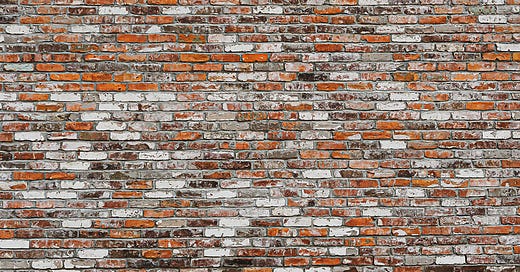The wind ran cold, channelled along the barely perceptible curve of the wall surrounding the village.
The vandal looked ordinary. Nothing special. He wasn’t struggling or remonstrating. He stood quietly, the burly young constable holding him in a firm grip. Was that really him? Is that what they looked like?
He thought of the illicit thrill he had experienced when everyone approached the wall, dozens of people spread out, slowly advancing here to see what the commotion was about.
The wall itself had loomed large, its relentless presence evident all the way to the horizon in both directions, the warning signs spaced at intervals along its full length always visible. The red text could be seen from a distance, its purpose clear.
Somehow they had all converged on the spot where the incident must have taken place. Surely it would be fine with all these other people here?
Although the vandal must have come here himself, on his own. He too must have seen the signs.
At least that’s what he’d heard, what he had managed to piece together. That constables had been called because someone had been caught inside the zone. Officials had been informed.
An older officer stood to one side of the constable holding the young man, a sergeant by the look of his uniform. His foot rested on a set of ladders lying on the ground. A third man was there, although it wasn’t obvious who he was. He could be a palisader.
Everyone kept their distance. An invisible barrier formed some ten yards from the scene. He couldn’t tell if it was maybe those first to arrive being told to stand back or just apprehension of the wall. Up close the huge warning sign was impossible to miss.
“They say he damaged the wall.”
He turned to look. The woman next to him was scrutinizing the vandal, her frenzied eyes darting between the sign and the young man as if not quite believing what she was seeing.
Near the top of the wall, directly ahead of them, several sharp marks stood out. It did look like damage. Artificial damage, not weathering, the unvarying darkness of the imposing blocks scarred by something.
And all that only a stone’s throw from the sign reminding the foolish of the penalty. He could remember approaching the signs as a boy, being dared to get close, the braver boys even touching them.
Looking again at the angry score marks near the top of the wall, it was baffling. Why go near it? He must be crazy, a madman.
People talked excitedly behind him just as he glimpsed the distinctive flash of crimson. A mature man approached the group at the wall, his pace steady and determined. An Official. His silver hair and confident bearing combined with the familiar scarlet uniform to give him his air of authority.
In the ensuing silence he could hear the wind rustle through the grass around them, his own position close enough to catch the Official greet the sergeant, still standing with his foot on the ladder.
“Property damage,” said the Official, peering up at the wall above them.
He looked down at the ladder.
“So this is the weapon of choice, is it?”
“Found at the scene, sir,” said the sergeant.
The Official looked back up at the wall, examining it while stepping back as if to get a better look.
“When are we making the amendments?” he said, looking back to the sergeant. “That’s the real solution here.”
“I don’t know, sir.”
“What height is it?”
“About ten feet.”
The other man stepped forward. He had to be a palisader this close to the wall.
“Only six feet in some places,” he said. “The older parts.”
“And what is the proposal?” said the Official, turning to face him.
“Nineteen feet eight inches, sir.”
The Official looked confused.
“That’s six metres, sir.”
“Ah,” said the Official. “Of course.”
The Official turned his attention to the young man.
“You know the penalty for vandalism.”
“I was trying to get over the wall.”
“Over?”
“Yes. Out. Away from here.”
“You know you cannot approach the wall, young man.”
“And yet here we all are,” he said, turning to indicate the crowd. “Within the proximity zone.”
“You damaged State property,” said the Official, ignoring the vandal’s comment.
“So what?”
A murmur ran through the crowd. Someone behind him asked if they’d heard correctly.
The Official didn’t react. He just turned to the sergeant.
“Take him away.”
The vandal reacted to the order, his agitation obvious. The sergeant joined the younger constable and gripped his free arm.
“Wait!” said the vandal. “This is crazy!”
The Official took a few steps closer to him.
“Pull yourself together, man,” he said. “Don’t make it any worse.”
“Worse? How could it get any worse?”
The Official said nothing, his nod to the sergeant clear.
As they dragged the vandal away, the Official turned, seeing the crowd as if for the first time.
“Disperse this rabble,” he said to the palisader.
Everyone was already moving.
“Why would anyone do that?” said a stranger walking beside him, his strides brisk and energetic.
“I know. I’ve heard of vandals. But I didn’t think we’d have them here.”
“No, not here. Never thought we’d see it here.”
The vandal’s shouts could barely be heard now, receding with every step.
“Although,” said the stranger. “Some villages have got rid of theirs.”
“Vandals?”
“No. Their walls.”
“Really?”
“So I’ve heard.”
He hurried along, flinching briefly as the sharp crack of the gunshot echoed in the air, channelled along the barely perceptible curve of the wall protecting the village.





Nice job, Spiff!
Thanks Spiff for a take well told with a lingering moral.